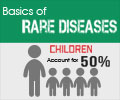
‘Ataxia oculomotor apraxia type XRCC1 is caused by a genetic mutation that disrupts the repair of our DNA.’
Tweet it Now
The study revealed that the disease, ataxia oculomotor apraxia type XRCC1 is caused by a genetic mutation that disrupts the repair of our DNA.
In people suffering from the new disease, the speeding up of this key enzyme actually triggers the death of brain cells, the researchers said."Discovering this new disease and its cause is a huge step towards developing drug-based therapies for other rare neurodegenerative conditions," said lead author Keith Caldecott, Professor at University of Sussex.
Drugs which target this key DNA repairing enzyme in the right way, could prove vital for treating people suffering from diseases caused by the over-activation of this protein - it is now crucial we determine what diseases these are.
Single strand breaks are one of the most common types of DNA damage and the researchers believe it's possible the discovery of this new genetic disease could be important for scientists researching other rare DNA repair related diseases.
Source-Medindia











